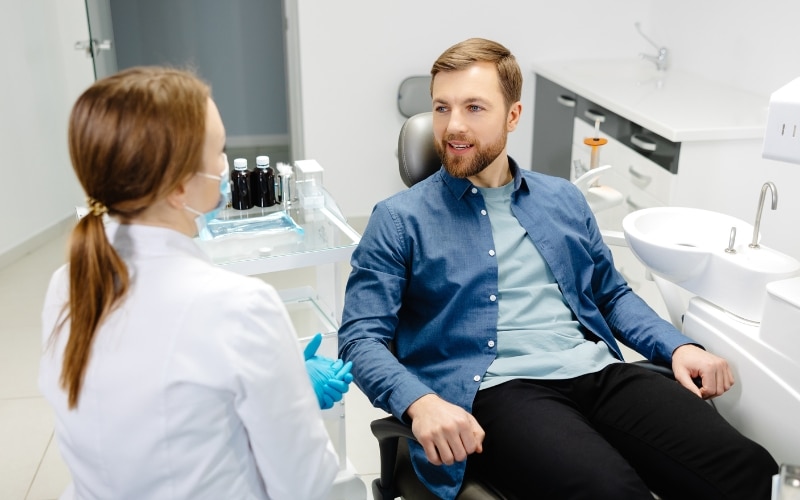New Patients Welcome!

Did you know that nearly 90% of adults in the world suffer from some form of dental disease? Many of these issues, however, are entirely preventable. By following a few simple habits, you can maintain strong, healthy teeth for a lifetime. Preventive dental care is essential not just for preserving your smile but for avoiding costly and painful procedures. Regular maintenance can help you avoid cavities, gum disease, and even tooth loss. By adopting good habits early on, you can ensure long-term oral health.
This blog will highlight five key habits you should incorporate into your daily routine to promote lifelong dental health. These habits are easy to follow and can significantly impact your oral well-being. So, let’s dive into these essential habits for a healthier smile!
The Science Behind Preventive Dental Care
Preventive dental care is more than just a routine; it is a scientific approach to safeguarding your oral health. Dental problems such as cavities and gum disease often develop over time, with early symptoms that go unnoticed. The buildup of plaque—a sticky layer of bacteria—begins as soon as you eat, and if not removed, it hardens into tartar, leading to further complications.
Routine care helps to break the cycle of bacteria buildup. For example, brushing and flossing remove plaque before it hardens into tartar, which can only be removed by a dentist. Regular dental checkups also allow professionals to catch early signs of issues like tooth decay, gingivitis, or even oral cancer, preventing these from progressing into serious problems.
The human mouth is home to millions of bacteria, but not all of them are harmful. However, without proper care, harmful bacteria can multiply, leading to infections and other oral diseases. Preventive habits such as regular brushing, flossing, and cleanings maintain a balance of good bacteria in the mouth. This minimizes the risk of inflammation, gum disease, and cavities.
By practicing preventive care, we intervene before serious issues arise, saving time, money, and pain. This proactive approach helps to preserve not only the structure but also the functionality of your teeth, ensuring that you can enjoy a healthy smile for years to come.
Major 5 Habits for Preventive Oral Care
Habit 1: Brush Your Teeth Twice a Day
Brushing your teeth is the most fundamental way to prevent cavities, gum disease, and bad breath. Regular brushing removes plaque, the sticky film of bacteria that forms after eating. If plaque is left on the teeth for too long, it can lead to tooth decay and other oral health issues.
Brushing should take at least two minutes. Use fluoride toothpaste and a soft-bristled toothbrush. Make sure to brush all surfaces—the outer, inner, and chewing surfaces of each tooth, as well as your tongue. Using gentle, circular motions helps avoid damaging your gums or enamel.
Change your toothbrush every three months or sooner if the bristles are worn. This ensures optimal cleaning effectiveness.
Habit 2: Floss Daily
Flossing is essential for reaching areas between your teeth that your toothbrush can’t. These spaces are often the first places plaque accumulates, leading to gum disease and cavities if not cleaned.
Gently slide the floss between your teeth and curve it into a “C” shape around each tooth. Move the floss up and down to remove food particles and plaque. Be careful not to snap the floss, as this can damage your gums.
If traditional flossing is difficult, consider using floss picks or a water flosser. These tools can make flossing easier and more comfortable, especially for people with braces or limited dexterity.
Habit 3: Eat a Tooth-Friendly Diet
What you eat plays a critical role in your dental health. Sugary and acidic foods promote plaque formation, while a poor diet can lead to weakened enamel and gum disease. A balanced diet rich in nutrients supports strong teeth and gums.
Dairy products like milk and cheese, which are rich in calcium, are also recommended. Leafy greens, crunchy vegetables like carrots and celery, and apples help clean teeth naturally and stimulate saliva production. These foods strengthen enamel and promote gum health.
Water is crucial for oral health. Drinking plenty of water washes away food particles and bacteria. It also promotes saliva production, which helps neutralize acids and protect teeth from decay.
Habit 4: Avoid Tobacco Products
Tobacco use is a major contributor to gum disease, tooth decay, and even oral cancer. Smoking or using smokeless tobacco products can lead to plaque buildup, staining, and serious health complications.
If you smoke, quitting is the best thing you can do for your oral health. Smoking also makes it harder for your gums to heal, increasing the risk of infections.
There are many resources available, from support groups to smoking cessation programs, that can help you quit. Protecting your oral health starts with breaking the tobacco habit.
Habit 5: Regular Dental Checkups and Cleanings
Regular visits to the dentist allow professionals to detect potential problems early on, even before you notice symptoms. Routine cleanings remove tartar and plaque buildup, which brushing and flossing can’t always eliminate.
During a routine visit, your dentist will examine your teeth, gums, and mouth for signs of disease or decay. X-rays may be taken to check for issues beneath the surface. Professional cleanings remove tartar and polish teeth, helping to keep your smile bright and healthy.
Schedule a dental visit every six months or as recommended by your dentist. These visits are key to maintaining lifelong oral health.
The Benefits of Preventive Dental Care for All Ages
Preventive dental care is important at every stage of life, from childhood to adulthood to senior years.
Establishing good habits early on can prevent cavities and set the foundation for lifelong oral health. Regular visits to the dentist can also address any developmental issues with the teeth or bite. Encouraging brushing, flossing, and healthy eating from an early age helps children develop habits that last into adulthood.
As we age, our dental needs evolve. Adults are at increased risk for gum disease and tooth decay. A good preventive routine can prevent costly treatments like fillings and crowns. Seniors, in particular, should focus on regular checkups to monitor for signs of oral cancer and age-related oral conditions, such as dry mouth or gum recession.
Preventive care is essential throughout life to maintain a healthy, functional smile. With the right habits, you can avoid pain, preserve your teeth, and enjoy eating, speaking, and smiling with confidence at any age.
Maintaining lifelong dental health is easier than it sounds. Brushing twice a day, flossing daily, eating a balanced diet, avoiding tobacco, and getting regular dental checkups form the foundation of strong, healthy teeth. By making these habits part of your daily routine, you can prevent major dental issues and keep your smile bright and strong for years to come.
Start today by adopting these habits and scheduling your next dental checkup with us. Small, consistent efforts lead to lasting results—protect your smile and invest in your oral health for a lifetime of happiness and confidence.




